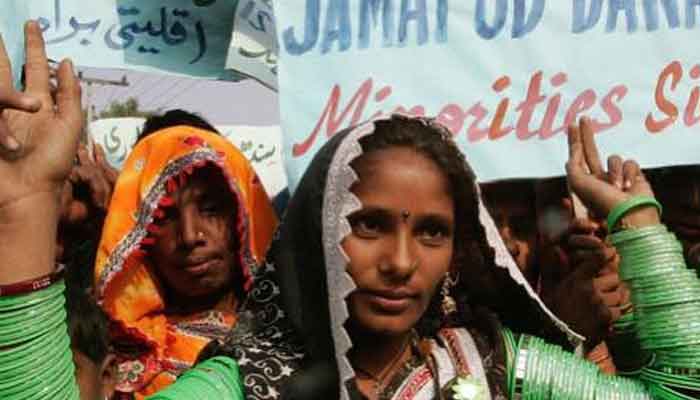Call for representation of scheduled castes on national minorities body
Parliamentarians and leaders from scheduled castes, an official term for historically disadvantaged Hindus, have expressed anger over the federal government not proposing names from their communities in the recently formed National Commission for Minorities (NCM).
Pakistan Peoples Party MPA Surendar Valasai accused the federal government of discrimination against the country’s scheduled caste communities by completely ignoring them in the proposed nominations for the NCM.
“We demand that the federal government include members in the commission in a separate category for scheduled castes,” said Valasai while talking to The News.
In 1956, Pakistan’s then government had declared up to 32 castes and tribes as scheduled castes in the country. Majority of them are lower Hindu castes such as Kolhi, Menghwar, Bheel, Bagri, Balmiki, Jogi and Oad. Even in the census, they are counted separately from Hindus (Jatis).
Valasai said that scheduled caste communities form majority of the Hindu population. “But unfortunately, not a single member has been nominated from among them by the Pakistan Tehreek-e-Insaf [PTI] government in the proposed NCM. This is sheer discrimination against the marginalised majority.”
He asked the Centre to take the Sindh government on board in the commission’s formation and induct the best brains from non-Muslim communities in accordance with their population ratio instead of turning it into another political arm of the ruling PTI.
Scheduled caste rights activist Mukesh Bheel said the government should sensitise itself about non-Muslim communities before devising policies and making nominations for bodies such as the NCM.
He said that the purpose of the 1956 legislation was to accord scheduled caste communities a special status by reserving a quota for them in fund allocations and jobs, thereby mainstreaming them in the process.
However, he added, census enumerators were not properly informed about the difference between the Hindu and schedule caste categories, which was why their numbers might appear less in the population count than what they actually were.
According to the census conducted in 1998, upper caste Hindus are just over 2.1 million, while members of the country’s scheduled caste communities are around 200,000 in number.
Leaders of scheduled caste communities said their numbers had been deliberately shown as fewer, adding that their lower numbers were also the main reason for their backwardness.
They explained that since they were not considered a major group in terms of numbers, they were not provided with an adequate share in the development budget.
According to the government notification issued to announce the members of the national minorities body, the religious ministry has proposed Chela Ram Kewlani from the Hindu community to be the commission’s chairman.
Official members will be representatives of the ministries of interior, law, human rights and federal education & professional training, the Council of Islamic Ideology chairman and the Ministry of Religious Affairs secretary.
As for unofficial members, Hindus will be represented by Jaipal Chhabria, Vishno Raja Qavi and Kewlani; Christians by Dr Sarah Safdar, Archbishop Sebastian Francis Shaw and Albert David; Sikhs by Dr Mimpal Singh and Saroop Singh; Parsis by Roshan Khursheed Bharucha; the Kalash by Dawood Shah and Muslims by Maulana Syed Muhammad Abdul Khabir Azad and Mufti Gulzar Ahmed Naeemi.
-
 Extreme Cold Warning Issued As Blizzard Hits Southern Ontario Including Toronto
Extreme Cold Warning Issued As Blizzard Hits Southern Ontario Including Toronto -
 Lana Del Rey Announces New Single Co-written With Husband Jeremy Dufrene
Lana Del Rey Announces New Single Co-written With Husband Jeremy Dufrene -
 Ukraine-Russia Talks Heat Up As Zelenskyy Warns Of US Pressure Before Elections
Ukraine-Russia Talks Heat Up As Zelenskyy Warns Of US Pressure Before Elections -
 Lil Nas X Spotted Buying Used Refrigerator After Backlash Over Nude Public Meltdown
Lil Nas X Spotted Buying Used Refrigerator After Backlash Over Nude Public Meltdown -
 Caleb McLaughlin Shares His Resume For This Major Role
Caleb McLaughlin Shares His Resume For This Major Role -
 King Charles Carries With ‘dignity’ As Andrew Lets Down
King Charles Carries With ‘dignity’ As Andrew Lets Down -
 Brooklyn Beckham Covers Up More Tattoos Linked To His Family Amid Rift
Brooklyn Beckham Covers Up More Tattoos Linked To His Family Amid Rift -
 Shamed Andrew Agreed To ‘go Quietly’ If King Protects Daughters
Shamed Andrew Agreed To ‘go Quietly’ If King Protects Daughters -
 Candace Cameron Bure Says She’s Supporting Lori Loughlin After Separation From Mossimo Giannulli
Candace Cameron Bure Says She’s Supporting Lori Loughlin After Separation From Mossimo Giannulli -
 Princess Beatrice, Eugenie Are ‘not Innocent’ In Epstein Drama
Princess Beatrice, Eugenie Are ‘not Innocent’ In Epstein Drama -
 Reese Witherspoon Goes 'boss' Mode On 'Legally Blonde' Prequel
Reese Witherspoon Goes 'boss' Mode On 'Legally Blonde' Prequel -
 Chris Hemsworth And Elsa Pataky Open Up About Raising Their Three Children In Australia
Chris Hemsworth And Elsa Pataky Open Up About Raising Their Three Children In Australia -
 Record Set Straight On King Charles’ Reason For Financially Supporting Andrew And Not Harry
Record Set Straight On King Charles’ Reason For Financially Supporting Andrew And Not Harry -
 Michael Douglas Breaks Silence On Jack Nicholson's Constant Teasing
Michael Douglas Breaks Silence On Jack Nicholson's Constant Teasing -
 How Prince Edward Was ‘bullied’ By Brother Andrew Mountbatten Windsor
How Prince Edward Was ‘bullied’ By Brother Andrew Mountbatten Windsor -
 'Kryptonite' Singer Brad Arnold Loses Battle With Cancer
'Kryptonite' Singer Brad Arnold Loses Battle With Cancer




